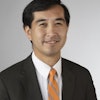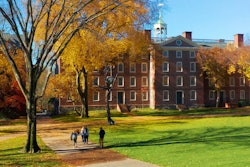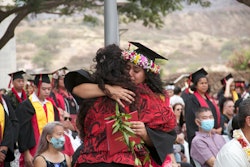Asian children being bullied at school can be a serious problem, and May Ying Chen wanted to let people know a federal-level bullying summit was to be held in New York City.
In October, Chen, a newly appointed member of the president’s Advisory Commission on Asian Americans and Pacific Islanders, held a news conference to tell the media, especially ethnic newspapers, that the summit was coming up. The news conference was short and informal and mostly attended by Chinese media.
She was disappointed by the turnout. In the future, she says, she will hold a roundtable to bring a wider range of ethnic media, many of which are based in New York City, into the mix.
Many Asians are not getting information about federal programs and resources that can help them, and the ethnic media is key to getting the word out, she says.
“I want to be a link or bridge,” says Chen, a former labor leader and an adjunct professor at the City University of New York’s Murphy Institute for Worker Education and Labor Studies.
This thinking is typical of her approach — practical and street smart, says Joyce Moy, who has known Chen for 30 years from community activities.
“Tweeting and Facebook are wonderful but not reaching a lot of people,” says Moy, executive director of CUNY’s Asian-American/Asian Research Institute. “May has been on the front lines. She knows who to reach, and how to do it.”
Chen, 64, became familiar with the challenges facing Asian immigrants while working for unions representing garment workers in New York’s Chinatown for nearly three decades.
Through the years, she taught immigrants English, citizenship and American history. She acted as a paralegal for workers and was a union organizer.
She rose in the administrative ranks of the union UNITE HERE’s Chinatown local, which had 25,000 members during its peak in the mid-’90s, many of whom assembled women’s sportswear.
By her retirement in 2009, she was one of the nation’s highest-ranking Asian labor leaders, serving as vice president of the Workers United/Service Employees International Union.
Now, as one of 20 members of the unpaid panel advising the White House Initiative on Asian Americans and Pacific Islanders, Chen wants to put her experience to good use.
The initiative, which has a full-time staff, is working to connect struggling small businesses, the long-term unemployed, victims of hate crimes, school dropouts, the poor, immigrants who don’t know English and others in need with agencies that can help them.
Chen traces her activism to movements that shook the nation during her formative years — including the Vietnam War protests and the push for civil rights and women’s rights.
She says she became aware of injustice in the world and saw how problems could be solved by bringing people together.
Raised in a middle-class family in Newton, Mass., Chen earned a bachelor’s degree in East Asian studies from Radcliffe College in 1970. She became a researcher of Asian-American issues at the University of California in Los Angeles.
Earning a master’s in education from UCLA, she taught Asian-American studies and later moved back to the East Coast. She settled in New York City with her husband, Rocky Chin, an Asian-American activist who became a civil rights attorney, and their two children.
Chen began working for unions in Chinatown and saw first-hand the problems immigrants go through.
At first, most of the workers in Chinatown were from Guangdong province in China. Later, they came over from Hong Kong, Shanghai and Taiwan. Some were ethnic Chinese from Vietnam and Burma.
Chen helped many people and cared deeply about the workers during her career, according to Lana Cheung, education director for Workers United/SEIU. “She would come early and stay late.”
Although retired, Chen is still doing her part to help unions.
Malcolm Amado Uno, former executive director of Asian Pacific American Labor Alliance, a group Chen founded, watched her at a training session for union organizers last spring.
“I saw her ability to connect with young leaders,” he says. “It was very humbling. She was incredibly gracious but direct.”
“She walks the walk,” he says.





















